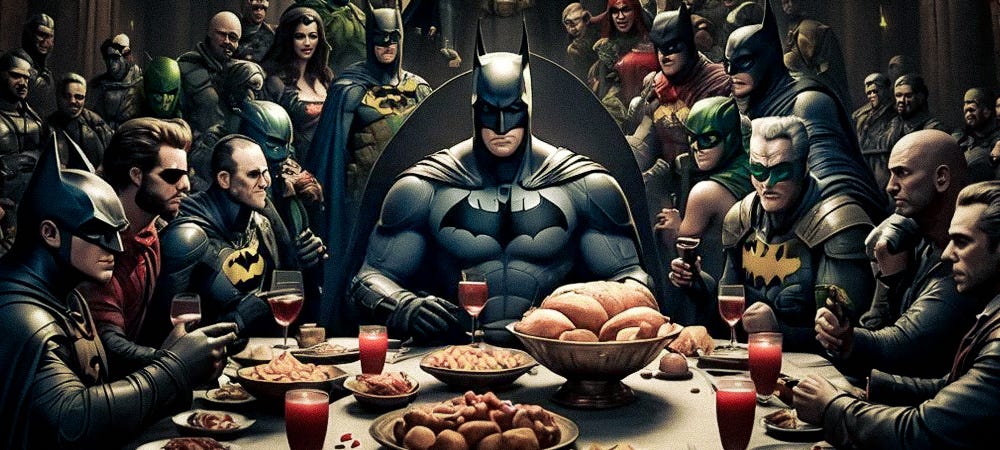from Lolita to the Last Supper: July 2024 Essay Recommendations
Growth in functional illiteracy, AI-generated Jesus images, abandoning our smartphones, that Olympics ceremony, and more in this month's recommended longforms.

Summer greetings! This will be a shorter, punchier version of the monthy roundup, mostly because it’s been the sort of month where the list of things I saved to read later ended up being longer than the list of things I actually read.
two or more moving parts
I spare less than a sliver of thought for anything related to the perennially controversial novel Lolita. But I have to spare at least a sliver for self-righteous individuals who think they are doing us all a favor by being professionally, publicly, and constantly outraged. This is old news, but I’m recommending this piece by
in entirely because of this rejoinder:…people, in their fervor for recreational hatred, are rendering themselves functionally illiterate… [they] appear utterly confounded not just by the difference between depiction and endorsement but by the expression of any thought that contains two or more moving parts...
Ouch. Discuss.
Adonai, not Adonis. There’s something going on with AI-generated images of an extremely physically attractive Jesus going viral on the internet. Caroline Mimbs Nyce has that report in The Atlantic. And, speaking of AI, she’s also written about Google’s Olympics ad which apparently suggested artificial intelligence could be used to write children’s fan letters instead of, you know, the kids actually writing letters themselves.
Distance makes better friends? Maggie Mertens makes a compelling case for friends developing deeper bonds because they don’t live close to each other. Makes sense to me.
no smartphone = smarter living?
My brother
is giving up his smartphone for a month, writing the device had been ‘choking out the mechanisms that I needed to flourish.’I needed solitude, space alone, and I filled it with others—videos or reels or conversations or texts. I needed silence and I suffocated myself with music and interviews and debates. I needed to pray, to listen, to speak slowly, to meditate, and instead, I’d consume more content—there’s a prayer app, don’t you know.
I know the distraction and inattentiveness the smartphone bequeaths. I know the urge to fill every waking moment with some kind of noise. A few weeks ago, I spitballed an idea for a “messenger phone,” one where you’re only allowed to use text-message apps. No social media, no streaming, no games, nothing but phone calls and texts. I can’t give up my smartphone just yet—the best I can do at the moment is leave it in another room while I write things like this—but we all have to work harder to loosen our devices’ grip on our inner lives.
Speaking of that…
- has an excellent piece on digital sabbaths in Plough, reminding us that as much as we might feel like we can’t do without our electronics, there is always some space for tucking them away and turning our attention to less-distracting, more spiritually-fulfilling practices.
someone say something about The Last Supper?
Yes, lots of people are saying lots of things about The Last Supper in light of the Paris 2024 Olympics opening ceremony. I haven’t waded as deeply into this as I would like (haven’t watched any of the Games at all). I tend to think, rightly, that anywhere there is extreme outrage expressed online, an immense oversimplification of debate and flattening of context is also happening. But there is a lot about this controversy that interests me: paganism, symbolism, iconic art in Western civilization, cultural literacy, and of course why American Christianity often strays so far from any semblance of Christ-like behavior.
I offer you two pieces:
- ’s eminently quotable essay, The Last Supper Holy War, Mocking God, and Outcasts at The Table. This is the most well-rounded take I’ve read about any controversy in recent memory. (I want to go off on a rabbit trail about how early Christianity borrowed from pagan Greco-Roman iconography, casting old stories and symbols with new meaning, and how it’s now coming full circle with institutional Christianity seemingly receding in the West while paganism re-emerges. This is not as bad as some might think, but more on that sometime in the future!) Houston opens the door to much-needed conversation not just about the thing itself, but about our reaction to it. I love it!
Jonathan Pageau’s freshly-dropped Symbolism Explained: The Olympics Opening Ceremony is Worse than You Thought. I haven’t watched the full video essay, but I listen to Pageau’s podcast weekly and he always brings interesting, thoughtful, outside-the-box (if sometimes speculative) perspectives on Scripture, church history, and the symbols that speak to us today.
Let’s end with something lite, shall we? Pay attention to this guy Josh Johnson. He’s an outstanding stand-up comedian. But he doesn’t tell jokes so much as he tells stories and relates the story to much larger stories, universal human conditions, and sometimes serious social commentary. The skill, insight, and artistry in his performances is to die for; he might just be the comedian of a generation. Give this 21-minute piece a listen and you’ll see what I mean.
Currently…
📺 Watching: Deadpool + Wolverine. This movie made a splash, but once you get over all the fan service, it’s really not that great of a film. (Also, how come calling yourself “Marvel Jesus” isn’t grounds for Christian internet outrage?)
🎧 Listening: movie soundtracks (The Dark Knight, The Dark Knight Rises, Dune 2, Interstellar, TENET, and Inception) are heavily in rotation as I’ve been working on my master’s thesis and a few essays.
📖 Reading: mostly research.
🔎 Exploring: anti-fantasy + fantasy-critical narratives that have suddenly become popular over the past couple years thanks to politics. (A pox on all your houses!)





Thanks for the exceedingly kind words!!